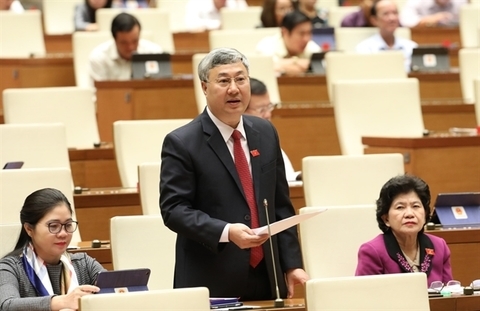 |
|
|
A majority of National Assembly (NA) deputies on Friday agreed with the Government’s proposal to write off VND16.4 trillion (US$705.5 million) worth of uncollectible tax.
The finance ministry reported on October 22 during the 14th National Assembly’s eighth meeting that outstanding tax payments rose 8.2 per cent in the first eight months of the year to VND88.25 trillion at the end of August.
The figure included uncollectible taxes which had not been paid by individuals, organisations and businesses for being declared dead, missing, lacking civil act capacity, dissolved, bankrupt and suffering from natural disasters.
Those are subject to the Government’s proposal on the amendment for the tax code, which is being discussed at the NA meeting.
Deputy Tran Van Lam from Bac Giang Province said writing off uncollectible taxes would not generate “virtual” tax liabilities and it would mean a lot for targeted subjects.
He said Government and local authorities must make sure the policy is done correctly and taxpayers would not be able to take advantage of it.
Tax agencies should also be held accountable for letting taxpayers delay their payments, deputy Tran Van Tien from Vinh Phuc Province said, adding people should be authorised to oversee tax collection and management to prevent on-purpose tax delaying.
Deputy Thach Phuoc Binh from Tra Vinh Province suggested the Government establish a council to help authorities with tax collection and management.
The council should include members representing business associations because they can tell real firms from dummies, he said.
For a company in which the owner is declared dead, his heir must continue fulfilling tax obligations, Binh said.
According to lawyer Ha Huy Phong, director of Inteco law firm, the draft decree on handling tax liabilities will help prevent individuals and firms from tax evasion.
Either a company or an individual can file for bankruptcy or insolvency and stop running business for a while. However, that company or individual may return in the name of a different entity. In that case, the entity and its owner are still obliged to pay tax liabilities.
On Friday, NA deputies also discussed solutions to drive socio-economic development for ethnic minority people and mountainous regions. They also debated the policy on licensing businesses for mineral and water exploration. – VNS
 Tax agencies should also be held accountable for letting taxpayers delay their payments.
Tax agencies should also be held accountable for letting taxpayers delay their payments.